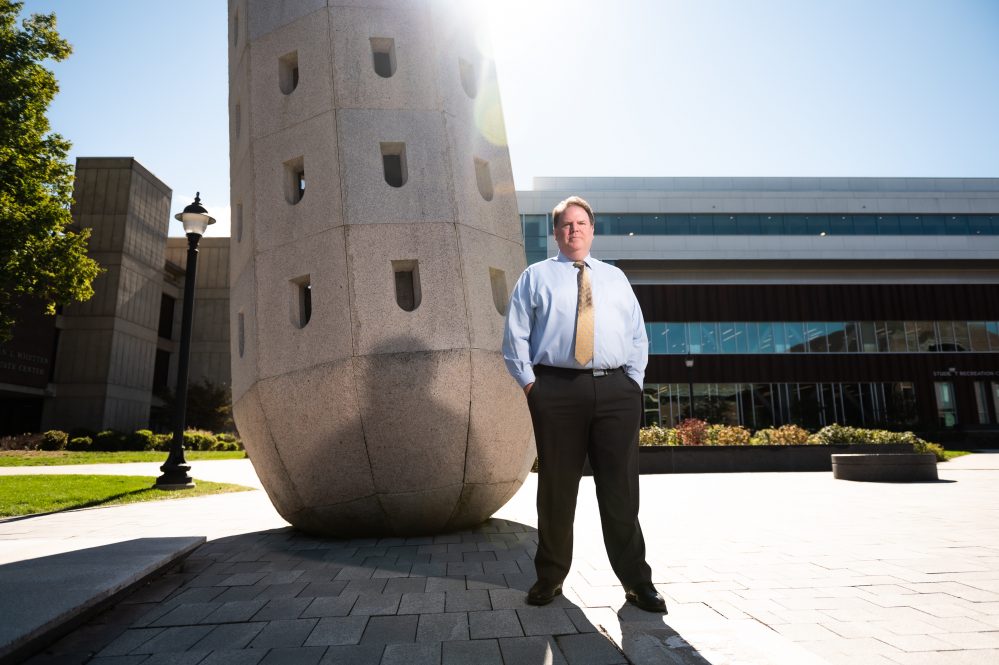As a new business student, David ‘Dave’ Wharmby ’89 (BUS), ’02 MBA took an introductory real estate course that changed his life.
“Professor Byrl Boyce was a very personable guy, with a dry sense of humor, who really wanted to make sure we understood the material,’’ Wharmby says. “He took some complex financial math and went over it again and again, until students really felt like they were masters of difficult material.’’
Wharmby was quickly “hooked” on real estate, took every course that Boyce taught, and enjoyed a rewarding, 30-plus years in the real estate industry.
Now Wharmby has returned to UConn, as the Director of the Center for Real Estate and Urban Economic Studies. He replaces Professor John Glascock, who retired this summer after 11 years at the helm.
“I’m really thrilled to be back. It is the opportunity of a lifetime to come back to my alma mater,’’ he says. “To help create the next steps for the Center means so much to me.’’
Wharmby inherits an elite program, that is ranked third in the world for real estate academic leadership, based on the strength of its faculty members’ research. It is also ranked No. 14 for real estate programs, according to U.S. News & World Report. Alumni are prominent leaders in commercial real estate in Hartford, Boston, New York, and beyond.
The Center prepares students for careers in commercial real-estate finance, teaching legal foundations and market analysis, cash-flow modeling and valuation, debt markets and portfolio management. Students meet industry leaders and alumni working in the field through numerous on-site presentations and internships. Graduates work in many types of real estate firms, including investment banking, valuation, equity investing, brokerage, rating agencies, development, finance and economic research.
Helping students excel in addressing pandemic-related challenges
Although the pandemic has disrupted commercial real estate, including office space and shopping centers, the profession remains a vibrant and exciting career choice, Wharmby says. Students bring a nimble outlook that will be needed in the industry in years to come.
“I think we’ll see a return to the office, but with much more emphasis on it being a gathering place, a communal social place for people from the same company,’’ Wharmby says. “The office will have to be a place that employees want to go to, a place that they’ll miss when they work from home.’’
“I think the evolving office will need to be a place where employees can find mentorship and employers can develop their company culture,’’ he continues. “The office of the future will create that connection. Smart investors are already recognizing that and moving toward the new office place.’’
One of the advantages of the industry is that it welcomes newcomers who have a wide range of skills.
“In real estate, every project is unique and brings its own characteristics, challenges and opportunities. No two days are the same,’’ he says. “It also offers options for different skillsets. If you love numbers, there’s something for you. If you lean toward sales, you can also thrive. Everyone can find a career here.’’
Wharmby earned two degrees from UConn
Wharmby earned his bachelor’s degree from the UConn Real Estate program in 1989 and an MBA in finance in 2002. As an alumnus, he always maintained a connection with the program.
He has worked in the industry for more than 30 years, most recently at Barings, a global investment manager, where he led the portfolio management and investment research for Real Estate Securities. He also previously worked for Cornerstone Real Estate. His expertise spans real estate finance, equity and securities. While he was primarily based in Hartford or Stamford, his work has taken him around the world. Hong Kong is his favorite home-away-from home with its vibrancy, great food and unique culture.
Wharmby says he is excited both about the energy of the students and the engagement and friendships that the UConn real estate community promotes.
“Like any business, the last few years have been challenging because of the pandemic and we’ve also had some retirements in the Center,’’ he says. “My immediate goal is to make sure we re-start and put everything back in place,’’ he said. He also plans to focus on student services and industry outreach and to work closely with the Center’s faculty on their research aspirations.



